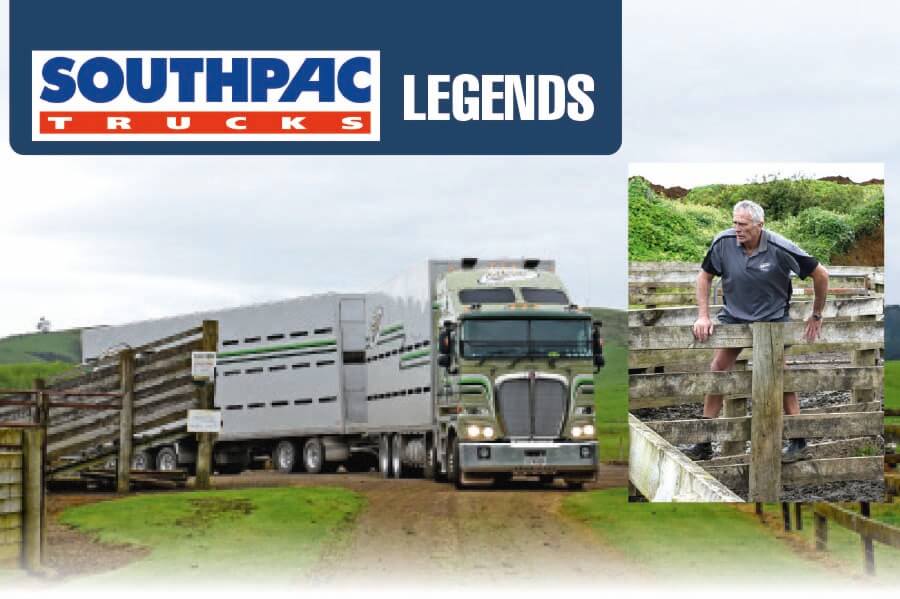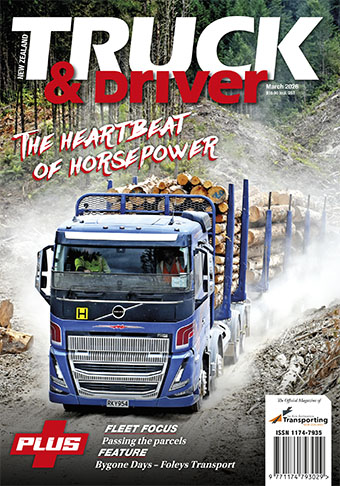Southpac Legends


A lifetime in livestock - Don Wilson - On Road Transport
Southpac Legends
What with increased compliance demands, driver shortages and angry bulls, the livestock industry is hard enough at the best of times, however, not only does ORT’s director Don Wilson run a successful livestock transport business in Pukekohe but for the past eight years he’s also worked tirelessly behind the scenes at the NRC, assisting other operators and paving the way for a better industry - and that’s why Don Wilson is a Southpac Legend.
According to Don, had things turned out differently he’d have been a diesel mechanic but the long and short of it ‘trucking is in his blood’. His father had a carriers business (general and livestock) and he says “that’s just the way it is.”
But don’t think for one moment he’s not a passionate and willing participant.
Wilson got his HT licence the moment he turned eighteen and hit the road almost immediately in a Mercedes 1418. At first doing general freight as a relief driver and then jumping into a stock truck and driving full time.
Wilson started work for United Carriers up in Northland and then split his time between Whangarei and Pukekohe before moving to produce company Balle Brothers in ‘94 where he helped create their livestock business.
...What with increased compliance demands, driver shortages and angry bulls, the livestock industry is hard enough at the best of times, however, not only does ORT’s director Don Wilson run a successful livestock transport business in Pukekohe but for the past eight years he’s also worked tirelessly behind the scenes at the NRC, assisting other operators and paving the way for a better industry - and that’s why Don Wilson is a Southpac Legend.
According to Don, had things turned out differently he’d have been a diesel mechanic but the long and short of it ‘trucking is in his blood’. His father had a carriers business (general and livestock) and he says “that’s just the way it is.”
But don’t think for one moment he’s not a passionate and willing participant.
Wilson got his HT licence the moment he turned eighteen and hit the road almost immediately in a Mercedes 1418. At first doing general freight as a relief driver and then jumping into a stock truck and driving full time.
Wilson started work for United Carriers up in Northland and then split his time between Whangarei and Pukekohe before moving to produce company Balle Brothers in ‘94 where he helped create their livestock business.
He says “I was involved with Balle Brothers in their livestock business from the beginning until when they decided that they wanted to concentrate on their produce business and separated out their livestock side.”
After around 18-months, the business had grown in size from one to two stock trucks and Wilson became part owner. The growth continued until 2014, when Balle Brothers opted to focus on their core produce side and after splitting the business, Wilson considerably increased his shareholding and began ORT (OnRoad Transport).
He recalls, “we had six trucks when we split and two owner-drivers and now we employ around seventeen drivers on staff, have a fleet of fifteen trucks and we also have seven owner-drivers.”
ORT predominantly works as livestock carriers, however they have one truck that works with containers and two in the logging industry. Don himself hasn’t been a full time driver since he was about twenty seven (having assumed a more managerial role), however, the 57-year old still hits the road in a part-time capacity when required “If I’m needed to fill in for a day or so, and I did the Milk Run this year.”
Around a similar time to when ORT began, Don joined the board of the NRC, his motivation was simple.
“Putting something back into the industry I work for. A lot of people complain about the industry but the only way to get something done is to get out there and do it, and you can’t win a fight or gain any traction by being an individual, you have to do it as a group. If you have a problem, you ring your association, they can lobby the problem for you. If it’s local we use the NRC and if it’s a nationwide issue then we use the Forum (RTF) to fight our arguments.”
Wilson says that it was Paul Chappell that invited him onto the NRC board and he immediately set about making a difference. He was heavily involved in instigating and organising the TR Group Driver Champs along with Mark Ngatuere (from the RTF). And again with Mark, spent a week touring the country talking to operators about the NAIT (National Animal Identification Tagging) declaration, we put a submission into Government and had the Operator liability taken out.
Wilson works predominantly in the livestock sector for the NRC and says that they’re continually fighting bureaucracy. Many operators are unaware but things go on behind the scenes that remove, change or minimise their impact on the industry. “We’ve got a big thing happening at the moment in the livestock sector, it’s a major problem and we’re trying to fix it. I spent two-days in Wellington just last week.”
He says he dislikes the increasing demands of compliance, but understands that it’s necessary, “I’m not saying we shouldn’t have it because without it the industry would be in a bigger shambles, but I’m about standardising things like health and safety policies, and consistency in rules for abattoirs or farms. For example, safety glasses on a farm on a humid day can present more harm than good, same goes for Hi-Viz wear near excitable Bulls.”
It’s clear that the NRC work can be very time consuming, a few days here, a week there, Wilson is frequently taking time out of his business for the better of the industry. Don points out that “without the support of my staff and the people around me I wouldn’t be able to do this.”
He says, “it’s a big commitment, not so much as a member of the board but when you get to vice chairman or chairman (which Don has been for the past 5 years) you have to dedicate a lot of time to it.”
Despite donating personal time and resources to the Association and the differences that he has made, there is an additional cost when taking time away from his business.
“The biggest impact on my business is while I’m trying to fight for the industry, people are in there chipping away at the business, that’s probably the biggest downfall of being involved. There’s still a disconnect between the industry and the Associations. Warren [Whittaker] said to me that ‘we [the livestock industry] need to employ somebody to do our fights’ but that’s what the Associations are for.”
Wilson says that there’s maybe three hundred registered livestock operators in the country, and although not all belong to associations, all reap the benefits of what they do.
“As an example, back in the day the Associations fought for 50-max, everybody got the advantages of the 50-max not just the members. Even currently with Covid border control, we worked with Nick Legget and the government about the animal welfare issues with lockdowns - it’s still not perfect but it’s better than it was.”
Wilson believes that to get a TSL number it should be compulsory to join an Association.
Regardless of the evident frustrations, Wilson is still incredibly passionate about the industry and moreover, its people. “the people you meet, the people you deal with. Our industry is probably getting to the point now where there’s a lot of good players in it, the Calven Bonney’s, Steve Doughty’s and Paul Chapell’s around the NRC environment and the Dave Benner’s, Warren Whittaker’s and Glenn Carroll’s from the livestock sector, we all get on really well. There’s less and less livestock operators out there now so you have to get on with other operators to try and make everything work.”
Wilson says that it’s impossible to pick out any one particular person that’s helped him out through his career, however, acknowledges that before he bought the business off Balles he spent quite a bit of time with Paul Chappell, ‘just sounding him out’ and when he’s had a few ‘issues’ that he’ll talk with Calven Bonney or Steve Doughty and ask “what do I do about this, or how do I fix this’, he also used to get a bit of knowledge out of Calvin Neville.
“You might have an idea to do something a certain way and then ring up and get a simpler (and often proven) way. That’s one of the main reasons I deal with Jackson’s, [Enterprises] I was told they’re simple and easy to deal with, and they are.”
Like many transport operators, there are a certain amount of challenges Wilson faces on a day to day basis, but he believes that the livestock sector has a few that are unique too.
“In terms of ownership or even drivers I don’t see the generation pull coming through any more. The industry does need a bit of a mindset change and how that’s done I don’t know. We pay our drivers what we can afford right now and we give them the best gear we can afford to buy, but the people we work for need to start appreciating us more for the effort that we put in. The new generation of farmers are normally not too bad but some of the old ones don’t quite understand what we have to do now to make everything work.”
When it comes to drivers, Wilson says that probably the biggest problem the livestock sector has is that there’s a big gap from when they leave school to when they can actually start driving the truck.
“There’s not too many livestock operators with a Class-2, so you can’t do much until you’re a Class-4. Also Animal welfare, you’ve got to have that at the back of your mind all of the time. How you drive, where you’re going, how you’re getting there. Some new driver’s can’t handle it.”
With nigh-on four decades under his belt, Wilson has accrued a lot of knowledge and seen plenty of changes along the way.
“When you’ve been in it all your life, when you’ve grown up with it, there’s a lot of information and experience in your head. When I first started there were no log books, now there’s work/time rules, health and safety is paramount now, employment contracts weren’t around, nor Port and Rail induction days. Animal welfare continually changes but we now have a ‘fit for transport’ app for drivers.”
With expansion still on his mind. the timeline for his retirement is still a fair way off yet, however, Wilson has a keen idea on how he’s going to spend it.
“I’d like to think that I’d get some time to myself when I’m in my sixties to fish and travel the world, and I think I’ll have a lifestyle block too.”
Maybe he’ll get some livestock of his own...



 + EQUIPMENT GUIDE - FREE
+ EQUIPMENT GUIDE - FREE
